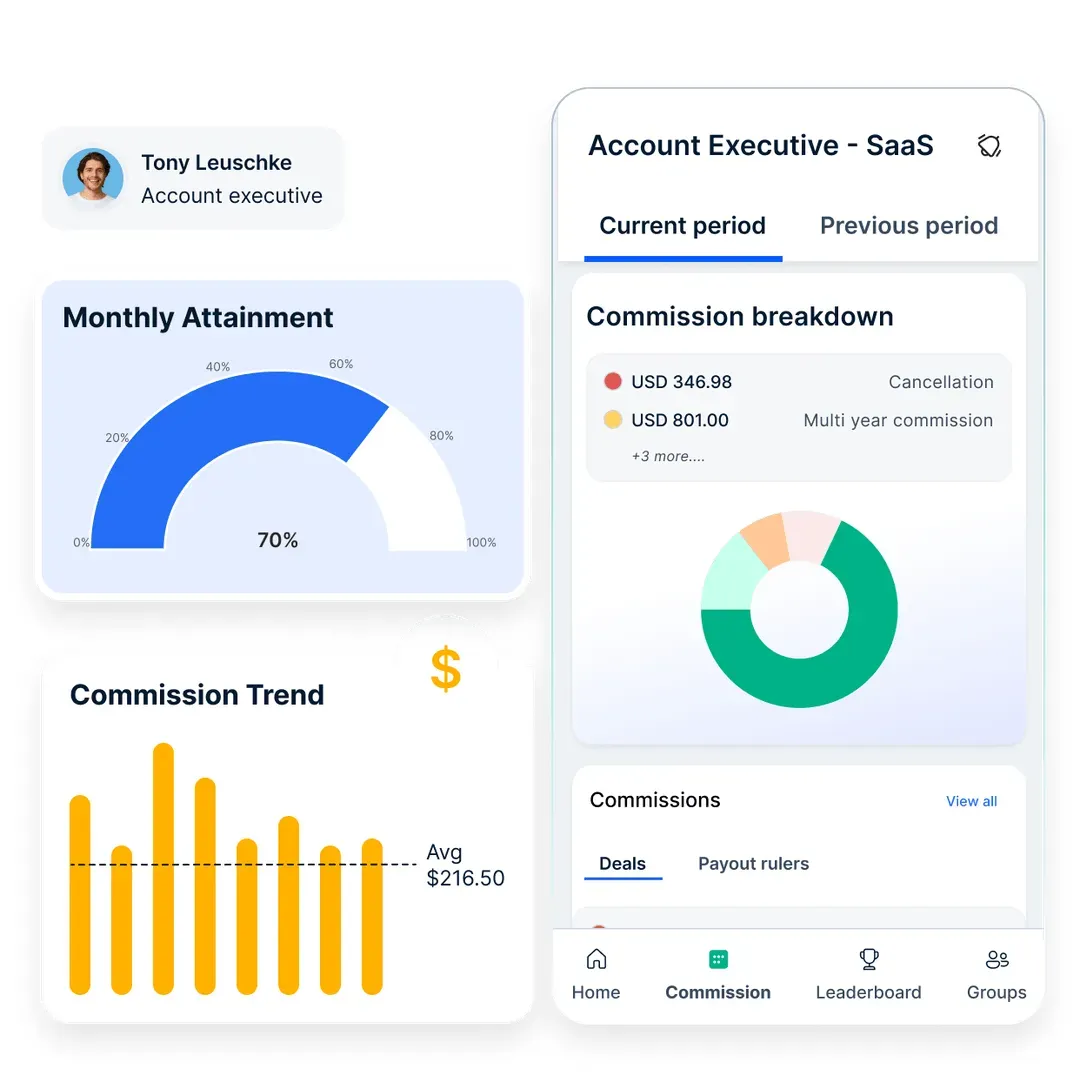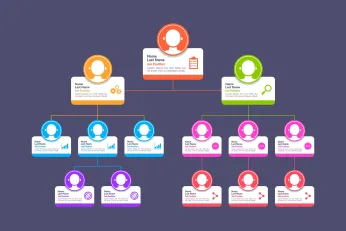20 Beispiele für negatives Feedback für Vertriebsteams zur konstruktiven Bewertung
Lernen Sie 20 Beispiele für negatives Feedback für Vertriebsteams kennen und erfahren Sie, wie die Bewältigung dieser Herausforderungen zu Wachstum und besserer Leistung führen kann.
Auf dieser Seite
Laut Brent Cassell, Advisory VP bei Gartner, ermöglicht das Sammeln und Einbeziehen von Feedback in das Gespräch den Managern, ein ganzheitliches Bild der Leistung des Mitarbeiters zu vermitteln. Das heißt, dass das Vertriebsfeedback eine entscheidende Komponente ist, die über den Erfolg eines Vertriebsteams entscheiden kann.
Positives Feedback ist zwar immer willkommen und wird geschätzt, aber auch negatives Feedback ist von großem Wert. Es dient als Verbesserungsinstrument und hilft den Vertriebsmitarbeitern, Bereiche zu identifizieren, in denen sie wachsen und sich verbessern können.
A von Gartner durchgeführte Untersuchung hat gezeigt, dass die Leistung der Mitarbeiter um 14 % steigt, wenn sie von Kollegen bewertet werden, deren Arbeit miteinander verbunden ist und die gemeinsame Ziele verfolgen.
Hinzu kommt, 99% der Mitarbeiter an, dass die direkte Bewertung von Managern einen Einfluss auf die Leistung der Mitarbeiter hat. In diesem Blog werden wir einige Beispiele für negatives Feedback für Vertriebsteams untersuchen und aufzeigen, wie sie den Weg für Wachstum und Spitzenleistungen ebnen können.
20 Beispiele für negatives Feedback für Verkaufsteams
Hier finden Sie 20 Beispiele für negatives Feedback für Vertriebsteams, um konstruktives Feedback zu geben.
1. Unzureichende Produktkenntnisse
Negatives Feedback: "Während der Kundenpräsentation hatten Sie Mühe, die technischen Fragen zu den Funktionen und Vorteilen unseres Produkts zu beantworten. Es schien, dass Sie nicht gut vorbereitet waren.
Implikation: Unzureichende Produktkenntnisse können ein erhebliches Hindernis für den Verkaufserfolg darstellen. Dieses Feedback unterstreicht die Notwendigkeit, dass Vertriebsmitarbeiter ihr Produkt in- und auswendig kennen, damit sie auf Kundenbedenken eingehen und das Wertversprechen effektiv und selbstbewusst präsentieren können.
Verbesserungsmaßnahmen: Regelmäßige Schulungen und der Zugang zu umfassenden Produktunterlagen können den Vertriebsmitarbeitern helfen, ihre Produktkenntnisse zu vertiefen. Wenn sie ermutigt werden, Fragen zu stellen und zu diskutieren, können sie ihr Fachwissen ebenfalls verbessern.
Einige Beispiele für negatives Feedback von Vertriebsmitarbeitern mit unzureichenden Produktkenntnissen sind:
- "Ihre Produktkenntnisse sind unzureichend, was bei Ihren letzten Verkaufsgesprächen deutlich wurde. Sie konnten die wichtigsten Merkmale und Vorteile unserer Produkte nicht erklären, was den Kunden bei seiner Kaufentscheidung verunsichert hat."
- "Ihre begrenzten Produktkenntnisse beeinträchtigen Ihre Glaubwürdigkeit bei den Kunden. Sie müssen Zeit investieren, um unsere Produkte in- und auswendig zu lernen, damit Sie bei potenziellen Kunden Vertrauen schaffen können."
- "Ihre unzureichenden Produktkenntnisse führen zu verpassten Chancen. Sie haben die Chance verpasst, einem Kunden ein besser geeignetes Produkt zu verkaufen, weil Sie nicht wussten, welche zusätzlichen Funktionen es bietet."
- "Ihre mangelnden Produktkenntnisse haben zu Fehlern und falschen Informationen für die Kunden geführt. Das wirft ein schlechtes Licht auf unser Unternehmen und kann künftige Kunden abschrecken. Es ist wichtig, sich in diesem Bereich zu verbessern."
- "Kunden haben sich unzufrieden geäußert, weil Sie nicht in der Lage sind, grundlegende Fragen zum Produkt zu beantworten. Um im Verkauf zu glänzen, müssen Sie es zur Priorität machen, unser Produktangebot zu beherrschen."
2. Schlechtes Zuhören
Negatives Feedback: "Während des Kundengesprächs haben Sie den Kunden mehrfach unterbrochen und seine Probleme nicht vollständig erfasst. Das hat Sie daran gehindert, eine maßgeschneiderte Lösung anzubieten."
Implikation: Wirksame Kommunikation erfordert aktives Zuhören. Wenn man nicht aufmerksam zuhört, kann das zu Missverständnissen und verpassten Gelegenheiten führen, relevante Lösungen anzubieten.
Maßnahmen zur Verbesserung: Vertriebsmitarbeiter können von einer Schulung in aktiven Zuhörtechniken profitieren. Rollenspiele, in denen sie einfühlsames Zuhören üben und klärende Fragen stellen, können ihre Fähigkeit verbessern, die Bedürfnisse der Kunden zu verstehen.
Einige Beispiele für negatives Feedback von Vertriebsmitarbeitern, die schlecht zuhören können, sind:
- "Ihre Fähigkeit, zuzuhören, muss verbessert werden. Bei Kundengesprächen unterbrechen Sie oft die Gespräche und gehen nicht auf die spezifischen Anliegen der Kunden ein. Das kann abschreckend wirken und eine effektive Kommunikation behindern."
- "Sie zeigen häufig eine schlechte Fähigkeit zum Zuhören, da Sie die Bedürfnisse des Kunden nicht vollständig verstehen. Dies führte kürzlich zu einer verpassten Gelegenheit, bei der Sie eine Lösung anboten, die nicht mit den Anforderungen des Kunden übereinstimmte."
- "Ihre unzureichende Fähigkeit, zuzuhören, hat zu Missverständnissen und Frustration bei den Kunden geführt. Um im Verkauf erfolgreich zu sein, ist es wichtig, zuzuhören, zu paraphrasieren und die Anliegen der Kunden aktiv zu bestätigen.
- "Ihre mangelnde Fähigkeit, zuzuhören, wirkt sich auf Ihre Fähigkeit aus, eine Beziehung zu Ihren Kunden aufzubauen. Um eine Beziehung aufzubauen, muss man die Herausforderungen und Bedürfnisse der Kunden verstehen und anerkennen."
- "Kunden haben ihre Unzufriedenheit zum Ausdruck gebracht, weil sie sich bei Ihren Kontakten nicht gehört fühlen. Um ein erfolgreicher Verkäufer zu sein, müssen Sie sich bemühen, aktiv zuzuhören und angemessen zu reagieren."
3. Fehlendes Follow-up
Negatives Feedback: "Sie haben es versäumt, sich nach dem ersten Treffen mit dem Kunden zu melden, wodurch wir ein potenzielles Geschäft verloren haben. Kunden legen Wert auf konsistente Kommunikation."
Implikation: Eine rechtzeitige Nachbereitung ist entscheidend für die Aufrechterhaltung einer starken Kundenbeziehung und den Abschluss von Geschäften. Wird die Nachbereitung vernachlässigt, kann dies zu verpassten Chancen und zur Erosion des Kundenvertrauens führen.
Verbesserungsmaßnahmen: Die Implementierung eines systematischen Follow-up-Prozesses, der automatische Erinnerungen und personalisierte Follow-up-Nachrichten umfassen kann, kann sicherstellen, dass potenzielle Leads angemessen gepflegt werden.
Einige der Beispiele für negatives Feedback für Vertriebsmitarbeiter in diesem Szenario sind:
- "Es ist problematisch, dass Sie es immer wieder versäumen, nach den ersten Treffen mit den Kunden nachzuhaken. Mehrere Leads sind deshalb kalt geworden. Sie müssen der Nachbereitung Priorität einräumen, um das Engagement aufrechtzuerhalten."
- "Der Mangel an Folgemaßnahmen ist ein großes Problem. Es wirft ein schlechtes Licht auf das Engagement unseres Unternehmens für den Kundenservice und könnte zu verpassten Chancen führen. Sie müssen ein systematisches Follow-up-Verfahren einrichten."
- "Ihr inkonsequentes Follow-up hat dazu geführt, dass sich die Kunden vernachlässigt fühlen. Das wirkt sich auf unsere Kundenbindung aus und könnte unserem Ruf schaden. Eine wirksame Nachbereitung ist ein entscheidender Aspekt des Verkaufs."
- "Gelegenheiten fallen durch die Maschen, weil Sie nicht ausreichend nachfassen. Ein angemessenes System, wie das Einrichten von Erinnerungen und die Verwendung eines CRM, sollte sicherstellen, dass keine Leads verloren gehen."
- "Sie haben eine wichtige Gelegenheit verpasst, weil Sie einen warmen Lead nicht sofort weiterverfolgt haben. Eine konsequente Nachbearbeitung ist für die Pflege von Leads und den Abschluss von Geschäften unerlässlich. Lassen Sie uns an diesem Aspekt Ihres Verkaufsansatzes arbeiten."
4. Übersehen von Kundenfeedback
Negatives Feedback: "Einige Kunden haben Bedenken zu einem bestimmten Aspekt unserer Dienstleistung geäußert, aber Sie sind in Ihren Interaktionen nicht angemessen auf diese Bedenken eingegangen."
Implikation: Das Ignorieren oder Herunterspielen von Kundenfeedback kann zu Unzufriedenheit und Geschäftsverlusten führen. Die Vertriebsteams müssen die Bedenken der Kunden umgehend zur Kenntnis nehmen und darauf eingehen.
Verbesserungsmaßnahmen: Wenn die Vertriebsmitarbeiter ermutigt werden, aktiv Feedback von den Kunden einzuholen und es an die zuständigen Teams weiterzuleiten, kann dies ein Zeichen für das Engagement für kontinuierliche Verbesserungen sein. Dies stärkt auch die Beziehung zwischen dem Unternehmen und seinen Kunden.
Einige der Beispiele für negatives Feedback für Vertriebsmitarbeiter, die Kundenfeedback übersehen, sind:
- "Sie haben wertvolles Kundenfeedback übersehen, das eine wahre Fundgrube an Erkenntnissen sein kann. Ihre Zurückhaltung bei Umfragen und Bewertungen von Kundenfeedback beeinträchtigt unsere Fähigkeit, unsere Produkte und Dienstleistungen zu verbessern."
- "Kundenfeedback zu ignorieren, schadet unserem Geschäft. Vor kurzem gab es einen Trend zu negativen Bewertungen über ein bestimmtes Produktproblem, das schon früher hätte angegangen werden können. Wir müssen das Kundenfeedback ernst nehmen, um unser Angebot zu verbessern."
- "Wenn wir das Feedback unserer Kunden nicht zur Kenntnis nehmen und darauf reagieren, haben wir eine Chance verpasst. Wir hatten mehrere Kunden, die Bedenken zu einem bestimmten Aspekt unserer Dienstleistung äußerten, aber es wurden keine Maßnahmen ergriffen. Das kann zu Kundenabwanderung führen."
- "Wenn wir dem Kundenfeedback keine Aufmerksamkeit schenken, gefährden wir unseren Ruf und die Zufriedenheit unserer Kunden. Es ist wichtig, dass wir uns aktiv mit dem Feedback auseinandersetzen und an der Lösung der von unseren Kunden angesprochenen Probleme arbeiten."
- "Ihre Missachtung des Kundenfeedbacks schadet unserer Fähigkeit, uns anzupassen und zu verbessern. Um im Vertrieb erfolgreich zu sein, müssen wir die Meinung unserer Kunden berücksichtigen und auf ihre Bedürfnisse und Anliegen eingehen."
5. Aufdringliche Verkaufstaktiken
Negatives Feedback: "Sie haben während des Gesprächs eine Verkaufstaktik mit hohem Druck angewandt, die dem Kunden Unbehagen bereitet hat. Diese Vorgehensweise kann unserem Ruf schaden und Kunden vergraulen.
Implikation: Aggressive oder aufdringliche Verkaufstaktiken können potenzielle Kunden abschrecken und dem Image des Unternehmens schaden. Der Aufbau von Vertrauen und Beziehungen ist entscheidend für erfolgreiche Verkaufsgespräche.
Verbesserungsmaßnahmen: Die Schulung der Verkaufsteams in beratenden Verkaufsmethoden, die sich auf das Verständnis der Kundenbedürfnisse und die Bereitstellung maßgeschneiderter Lösungen konzentrieren, kann zu positiveren Ergebnissen führen.
Einige der Beispiele für negatives Feedback für Vertriebsmitarbeiter in diesem Szenario sind:
- "Ihre aggressive und aufdringliche Verkaufstaktik hat zu Beschwerden von Kunden geführt. Es ist wichtig, ein Gleichgewicht zwischen Durchsetzungsvermögen und Respekt vor den Präferenzen des Kunden zu finden. Wir müssen Vertrauen aufbauen, nicht Druck ausüben."
- "Ihr aufdringlicher Verkaufsansatz hat dazu geführt, dass sich mehrere Kunden unwohl fühlten und in einigen Fällen Aufträge stornierten. Wir sollten unseren Ansatz auf eine beratende und kundenorientierte Herangehensweise umstellen, um bessere Beziehungen zu fördern."
- "Wenn wir zu sehr auf den Verkauf drängen, können wir die Kunden verprellen. Wir sollten einen kooperativen Ansatz anstreben, der aktiv auf ihre Bedürfnisse eingeht und sie zur besten Lösung führt.
- "Ihre aufdringliche Taktik war kontraproduktiv. Mehrere Leads sind aufgrund des hohen Drucks, den Sie ausgeübt haben, kalt geworden. Es ist wichtig, flexibler zu sein und sich dem Tempo des Kunden anzupassen.
- "Aufdringliche Verkaufstaktiken können unseren langfristigen Beziehungen und unserem Ruf schaden. Es ist wichtig, seinen Ansatz anzupassen und sich darauf zu konzentrieren, die Bedürfnisse des Kunden zu verstehen und einen Mehrwert zu bieten, anstatt auf einen schnellen Abschluss zu drängen."
6. Ungenaue Weitergabe von Informationen
Negatives Feedback: "Während der Kundenpräsentation haben Sie falsche Informationen über unsere Preisstruktur und Konditionen gegeben. Das führte zu Verwirrung und Misstrauen."
Implikation: Ungenaue Informationen können der Glaubwürdigkeit schaden und das Vertrauen des Kunden in das Produkt und den Verkäufer untergraben.
Verbesserungsmaßnahmen: Indem man das Verkaufspersonal ermutigt, Informationen zu überprüfen, bevor sie weitergegeben werden, und indem man ein klares System für den Zugang zu genauen und aktuellen Details hat, kann man Fehlinformationen vermeiden.
Einige der Beispiele für negatives Feedback für Vertriebsmitarbeiter in diesem Szenario sind:
- "Die Weitergabe ungenauer Informationen an Kunden schadet unserer Glaubwürdigkeit. Vor kurzem haben Sie einem Kunden falsche Preisangaben gemacht, was zu Verwirrung und Misstrauen geführt hat."
- "Eine ungenaue Weitergabe von Informationen kann zu Streitigkeiten und unzufriedenen Kunden führen. Es ist von entscheidender Bedeutung, dass die von Ihnen bereitgestellten Informationen aktuell und korrekt sind, um Vertrauen und Glaubwürdigkeit zu schaffen.
- "Ihre Unfähigkeit, genaue Informationen zu liefern, ist ein großes Problem. Wir müssen sicherstellen, dass die Kunden volles Vertrauen in unser Fachwissen und die Richtigkeit der von uns weitergegebenen Informationen haben."
- "Die ungenauen Informationen, die bei der letzten Kundenbesprechung weitergegeben wurden, führten zu einer verpassten Gelegenheit. Es ist wichtig, alle Details zu überprüfen, bevor man den Kunden Informationen gibt."
- "Ungenaue Informationen beeinträchtigen das Vertrauen des Kunden und können zu Streitigkeiten führen. Wir sollten uns darauf konzentrieren, die Genauigkeit zu verbessern und sicherzustellen, dass alle Informationen, die wir weitergeben, korrekt sind.
7. Fehlende Personalisierung
Negatives Feedback: "Ihre Kommunikation mit dem Kunden fühlte sich allgemein an und es fehlte an Personalisierung. Sie hatten nicht das Gefühl, dass Sie ihre spezifischen Bedürfnisse verstanden haben."
Implikation: Wenn das Verkaufsgespräch nicht auf die besonderen Anforderungen des Kunden zugeschnitten ist, kann die Chance verpasst werden, eine tiefere Beziehung aufzubauen.
Verbesserungsmaßnahmen: Wenn Vertriebsmitarbeiter darin geschult werden, das Geschäft und die Probleme des Kunden vor der Interaktion zu erforschen und zu verstehen, können sie persönlichere und überzeugendere Angebote erstellen.
Einige der Beispiele für negatives Feedback für Vertriebsmitarbeiter in diesem Szenario sind:
- "Ihrem Verkaufsansatz fehlt es an Personalisierung. Die Kunden haben geäußert, dass sie sich wie eine weitere Nummer fühlen. Es ist wichtig, dass Sie Ihre Interaktionen und Empfehlungen auf ihre spezifischen Bedürfnisse zuschneiden."
- "Die Kunden haben einen Mangel an Personalisierung in ihren Interaktionen mit Ihnen bemängelt. Wir müssen ein echtes Interesse an ihren einzigartigen Herausforderungen und Vorlieben zeigen, um stärkere Beziehungen aufzubauen.
- "Wenn man nicht persönlich auf den Kunden eingeht, ist es schwierig, sinnvolle Verbindungen herzustellen. Es ist wichtig, etwas über den Hintergrund und die Bedürfnisse des Kunden zu erfahren, um maßgeschneiderte Lösungen anbieten zu können.
- "Ihr pauschaler Ansatz beeinträchtigt unsere Fähigkeit, auf die Bedürfnisse unserer Kunden effektiv einzugehen. Um sich zu verbessern, sollten Sie sich darauf konzentrieren, Ihre Empfehlungen und Ihre Kommunikation zu personalisieren."
- "Der Mangel an Personalisierung hindert uns daran, die Wünsche der Kunden wirklich zu verstehen. Lassen Sie uns daran arbeiten, persönlichere Beziehungen aufzubauen, um Vertrauen und Loyalität zu fördern.
8. Versäumte Fristen
Negatives Feedback: "Sie haben dem Kunden ein Angebot zu einem bestimmten Termin versprochen, es aber nicht rechtzeitig geliefert. Das wirft ein schlechtes Licht auf unsere Zuverlässigkeit."
Auswirkung: Die Nichteinhaltung von Fristen kann das Vertrauen untergraben und den Eindruck erwecken, dass das Unternehmen den Bedürfnissen des Kunden keine Priorität einräumt.
Maßnahmen zur Verbesserung: Ein besseres Zeitmanagement und die Festlegung realistischer Fristen können den Verkaufsteams helfen, ihre Verpflichtungen konsequent einzuhalten.
Einige der Beispiele für negatives Feedback für Vertriebsmitarbeiter in diesem Szenario sind:
- "Das Versäumen von Fristen schadet unserem Ruf. Kürzlich haben wir einem Kunden ein versprochenes Angebot nicht rechtzeitig geliefert, was sein Vertrauen in unsere Zuverlässigkeit erschüttert hat."
- "Ihre ständige Nichteinhaltung von Fristen schadet unseren Kundenbeziehungen. Verlässlichkeit und Pünktlichkeit sind im Verkauf entscheidend. Wir müssen an diesem Aspekt arbeiten."
- "Die Kunden haben ihre Frustration über verpasste Termine zum Ausdruck gebracht, was zu Unzufriedenheit und sogar zu Vertragsauflösungen geführt hat. Es ist unerlässlich, dass wir unsere Verpflichtungen einhalten.
- "Das Versäumen von Fristen kann zu verpassten Chancen führen. Um im Vertrieb erfolgreich zu sein, müssen wir unser Zeitmanagement verbessern und sicherstellen, dass wir alle vereinbarten Termine einhalten."
- "Ihre Unfähigkeit, Termine einzuhalten, beeinträchtigt unsere Kundenbeziehungen und unsere Vertriebseffizienz. Lassen Sie uns der Pünktlichkeit Vorrang einräumen, um das Vertrauen wiederherzustellen und unsere Ziele konsequent zu erreichen."
9. Vernachlässigung der Unterstützung nach dem Verkauf
Negatives Feedback: "Nach dem Abschluss des Geschäfts waren Sie für die Nachbetreuung nicht erreichbar. Der Kunde fühlte sich im Stich gelassen, und das beeinträchtigte seine Gesamtzufriedenheit.
Implikation: Das Ignorieren von Kunden nach dem Verkauf kann zu Unzufriedenheit führen und das Potenzial für Upselling und Wiederholungsgeschäfte beeinträchtigen.
Verbesserungsmaßnahmen: Vertriebsmitarbeiter sollten verstehen, dass ihre Verantwortung über den Verkauf hinausgeht. Eine kontinuierliche Betreuung und die Überprüfung der Kundenzufriedenheit können das Kundenerlebnis verbessern.
Einige der Beispiele für negatives Feedback für Vertriebsmitarbeiter in diesem Szenario sind:
- "Ihre mangelnde Nachbearbeitung nach einem Geschäftsabschluss beeinträchtigt unsere Kundenzufriedenheit. Die Kunden haben berichtet, dass sie sich nach dem Kauf nicht unterstützt fühlen."
- "Wir haben Beschwerden von Kunden über das Fehlen von Unterstützung nach dem Verkauf erhalten. Es ist wichtig, die Beziehung über den Verkauf hinaus zu pflegen".
- "Die Vernachlässigung des Kundendienstes nach dem Verkauf kostet uns potenzielle Folgeaufträge. Wir müssen dieses Problem angehen, um Kunden zu binden.
- "Der Mangel an Engagement nach dem Verkauf schadet unserem Ruf. Lassen Sie uns an der Verbesserung unseres Kundensupports arbeiten."
- "Der Post-Sale-Support ist ein wichtiger Teil unseres Verkaufsprozesses, und Ihre Vernachlässigung in diesem Bereich wirkt sich auf unsere Kundenbindungsraten aus."
10. Unzureichende Bearbeitung von Einwänden
Negatives Feedback: "In der Verhandlungsphase hatten Sie Schwierigkeiten, auf die Einwände des Kunden wirksam einzugehen. Ihre Antworten waren vage und konnten die Bedenken des Kunden nicht ausräumen.
Implikation: Wenn es nicht gelingt, Einwände überzeugend zu formulieren, kann das zu einem verlorenen Geschäft führen. Die Kunden brauchen die Gewissheit, dass ihre Bedenken ernst genommen werden.
Verbesserungsmaßnahmen: Vertriebsteams können von Schulungen zur Einwandbehandlung profitieren, in denen sie lernen, Einwände zu antizipieren und gut strukturierte, selbstbewusste Antworten zu geben, die die Bedenken des Kunden direkt ansprechen.
Einige der Beispiele für negatives Feedback für Vertriebsmitarbeiter in diesem Szenario sind:
- "Ihre Unfähigkeit, Einwände effektiv zu behandeln, führt zu verlorenen Verkaufschancen. Wir müssen uns in diesem Bereich verbessern."
- "Die Kunden sind frustriert, weil auf ihre Anliegen nicht eingegangen wird. Wir müssen an unseren Fähigkeiten arbeiten, mit Einwänden umzugehen.
- "Die unzureichende Behandlung von Einwänden ist ein wesentliches Hindernis beim Abschluss von Geschäften. Wir sollten uns auf Schulungen konzentrieren, um diesen Aspekt unseres Verkaufsansatzes zu verbessern."
- "Einwände sind ein natürlicher Teil des Verkaufsprozesses, aber wir können nicht weiterhin potenzielle Kunden aufgrund einer schlechten Einwandbehandlung verlieren."
- "Unsere Konkurrenten sind besser im Umgang mit Einwänden, und das beeinträchtigt unsere Wettbewerbsfähigkeit. Wir müssen unser Spiel in diesem Bereich verbessern.
11. Mangel an proaktiver Kommunikation
Negatives Feedback: "Sie haben darauf gewartet, dass der Kunde den Kontakt aufnimmt, anstatt proaktiv auf den Kunden zuzugehen und ihn auf dem Laufenden zu halten. Dies vermittelte den Eindruck, dass Sie nicht in das Geschäft des Kunden investiert waren.
Implikation: Proaktive Kommunikation ist für den Aufbau enger Kundenbeziehungen unerlässlich. Darauf zu warten, dass der Kunde die Führung übernimmt, kann einen Mangel an Initiative und Engagement vermitteln.
Verbesserungsmaßnahmen: Die Ermutigung von Vertriebsmitarbeitern zu regelmäßiger Kommunikation, auch ohne unmittelbare Aktualisierungen, zeugt von Aufmerksamkeit und Engagement für die Bedürfnisse des Kunden.
Einige der Beispiele für negatives Feedback für Vertriebsmitarbeiter in diesem Szenario sind:
- "Die Kunden haben unseren Mangel an proaktiver Kommunikation bemerkt. Wir müssen mehr auf sie eingehen und sie einbeziehen, bevor sie sich an uns wenden müssen.
- "Proaktive Kommunikation ist für die Pflege von Kundenbeziehungen unerlässlich. Wir müssen mehr Initiative zeigen, um unsere Kunden zu informieren.
- "Unsere Konkurrenten sind besser darin, ihre Kunden auf dem Laufenden zu halten. Wir sollten unsere proaktive Kommunikation verbessern, um wettbewerbsfähig zu bleiben."
- "Wir hatten Fälle, in denen sich Kunden vernachlässigt fühlten, weil wir in unserer Kommunikation nicht proaktiv waren. Das sollten wir angehen."
- "Ihr Mangel an proaktiver Kommunikation behindert unsere Fähigkeit zu Upselling und Cross-Selling. Wir müssen proaktiver sein, wenn es darum geht, Chancen zu erkennen.
12. Ungelöste Kundenbeschwerden
Negatives Feedback: "Der Kunde war mit unserem Service unzufrieden, und obwohl Sie auf seine Bedenken aufmerksam gemacht wurden, haben Sie keine wirksamen Schritte unternommen, um sie zu beseitigen."
Auswirkung: Das Ignorieren oder der falsche Umgang mit Kundenbeschwerden kann zu Kundenabwanderung führen und den Ruf des Unternehmens schädigen.
Verbesserungsmaßnahmen: Die Einrichtung eines klaren Verfahrens für die Bearbeitung von Kundenbeschwerden und die Einbeziehung der erforderlichen Teams, um zeitnahe Lösungen zu finden, ist für die Aufrechterhaltung der Kundenzufriedenheit unerlässlich.
Einige der Beispiele für negatives Feedback für Vertriebsmitarbeiter in diesem Szenario sind:
- "Wir haben mehrere Beschwerden von Kunden erhalten, die nicht umgehend gelöst wurden. Das wirft ein schlechtes Licht auf unseren Kundenservice."
- "Ungelöste Kundenbeschwerden schaden unserem Ruf und wir riskieren, Kunden zu verlieren. Wir müssen diese Probleme umgehend angehen".
- "Wenn wir Kundenbeschwerden nicht lösen, schadet das unserer Kundenzufriedenheit. Lassen Sie uns einer schnellen und effektiven Lösung den Vorrang geben."
- "Die Kunden sind frustriert, weil ihre Probleme nicht zu ihrer Zufriedenheit gelöst werden. Wir brauchen ein effektiveres Verfahren für die Bearbeitung von Beschwerden".
- "Wir können es uns nicht leisten, dass sich ungelöste Kundenbeschwerden anhäufen. Sie können zu Geschäftseinbußen und einem geschädigten Markenimage führen."
13. Uneinheitliches Nutzenversprechen
Negatives Feedback: "In verschiedenen Gesprächen haben Sie das Wertversprechen unseres Produkts unterschiedlich dargestellt und die Kunden damit verwirrt, was wir eigentlich anbieten."
Implikation: Ein inkonsistentes Wertversprechen kann zu uneinheitlichen Botschaften führen und den Aufbau eines klaren Markenimages behindern.
Verbesserungsmaßnahmen: Wenn sichergestellt wird, dass alle Vertriebsmitarbeiter ein standardisiertes Verständnis des Wertangebots und der Botschaft des Unternehmens haben, können Diskrepanzen vermieden und ein einheitlicher Vertriebsansatz geschaffen werden.
Einige der Beispiele für negatives Feedback für Vertriebsmitarbeiter in diesem Szenario sind:
- "Die Inkonsistenz unseres Wertangebots verwirrt potenzielle Kunden. Wir müssen eine klare und konsistente Botschaft vermitteln."
- "Uneinheitliche Botschaften über unser Wertversprechen machen es den Kunden schwer, unsere Alleinstellungsmerkmale zu verstehen. Das muss angegangen werden."
- "Unser Wertversprechen sollte kristallklar sein, ist es aber nicht. Lassen Sie uns daran arbeiten, unsere Botschaft zu verfeinern und einheitlich zu vermitteln.
- "Uneinheitlichkeit in unserem Wertangebot schwächt unsere Markenidentität. Wir müssen sicherstellen, dass jeder im Team auf derselben Seite steht.
- "Uneinheitliche Wertversprechen machen es für die Kunden schwierig, unseren Angeboten zu vertrauen. Wir müssen unsere Botschaften vereinheitlichen, um ihr Vertrauen zu gewinnen."
14. Vernachlässigung des Aufbaus von Beziehungen
Negatives Feedback: "Sie haben sich ausschließlich auf die Transaktion konzentriert und keine Zeit in den Aufbau einer Beziehung zum Kunden investiert. Dies führte zu einem Mangel an Vertrauen und Verbindung."
Implikation: Verkaufsinteraktionen sollten über den unmittelbaren Verkauf hinausgehen und sich auf den Aufbau dauerhafter Beziehungen konzentrieren. Wird der Aufbau von Beziehungen vernachlässigt, kann dies das Potenzial für Folgegeschäfte und Weiterempfehlungen beeinträchtigen.
Verbesserungsmaßnahmen: Vertriebsteams sollten sich vorrangig darum bemühen, authentische Beziehungen zu Kunden aufzubauen, sich Zeit zu nehmen, um ihre Ziele und Herausforderungen zu verstehen, und echtes Interesse an ihrem Erfolg zu zeigen.
Einige der Beispiele für negatives Feedback für Vertriebsmitarbeiter in diesem Szenario sind:
- "Sie verpassen Gelegenheiten, dauerhafte Beziehungen zu Kunden aufzubauen. Das ist entscheidend für Folgeaufträge und Empfehlungen."
- "Wenn wir den Aufbau von Beziehungen vernachlässigen, schränkt das unsere langfristige Kundenbindung ein. Wir sollten uns darauf konzentrieren, stärkere Verbindungen zu kultivieren."
- "Starke Kundenbeziehungen führen zu Vertrauen und mehr Umsatz. Wir müssen mehr Gewicht auf den Aufbau und die Pflege dieser Beziehungen legen."
- "Unsere Konkurrenten sind im Beziehungsaufbau hervorragend, und wir müssen aufholen. Wenn wir diesen Aspekt vernachlässigen, schadet das unserem Umsatzpotenzial."
- "Langfristige Kundenbeziehungen sind das Lebenselixier unseres Geschäfts. Wir müssen mehr in die Pflege dieser Beziehungen investieren."
15. Mangelnde Bereitschaft zur Anpassung
Negatives Feedback: "Trotz der sich verändernden Marktdynamik haben Sie weiterhin veraltete Verkaufsstrategien angewandt. Das hat Ihre Fähigkeit beeinträchtigt, mit den Kunden in Kontakt zu treten und auf ihre aktuellen Bedürfnisse einzugehen."
Implikation: Die Vertriebslandschaft entwickelt sich ständig weiter, und die mangelnde Bereitschaft, sich anzupassen, kann zu verpassten Chancen und geringerer Effektivität führen.
Verbesserungsmaßnahmen: Vertriebsmitarbeiter sollten ermutigt werden, sich über Branchentrends auf dem Laufenden zu halten und offen für neue Strategien und Ansätze zu sein, die den aktuellen Marktbedingungen entsprechen.
Einige der Beispiele für negatives Feedback für Vertriebsmitarbeiter in diesem Szenario sind:
- "Ihre Weigerung, sich an die veränderten Marktbedingungen anzupassen, wirkt sich auf unsere Verkaufszahlen aus. Wir müssen in unserem Ansatz flexibler sein.
- "Die Branche entwickelt sich weiter, und Ihre mangelnde Bereitschaft, sich an neue Verkaufstechniken und -instrumente anzupassen, beeinträchtigt unsere Wettbewerbsfähigkeit."
- "Unsere Konkurrenten passen sich schnell an, und Ihre mangelnde Bereitschaft, sich zu verändern, ist ein Nachteil für uns. Wir müssen in unseren Strategien flexibler sein."
- "Wir müssen auf dem sich ständig verändernden Markt relevant bleiben, und Ihre mangelnde Bereitschaft, sich anzupassen, hindert uns daran, dies zu tun.
- "Wenn wir nicht bereit sind, uns anzupassen, verpassen wir Chancen. Wir müssen offener für Veränderungen und Innovationen sein, um an der Spitze zu bleiben.
16. Fehlende Qualifizierung von Leads
Negatives Feedback: "Sie haben Leads verfolgt, die nicht zu unserem Produkt passten, und damit wertvolle Zeit und Ressourcen für Interessenten verschwendet, die wahrscheinlich nicht konvertieren würden."
Auswirkung: Eine unzureichende Qualifizierung von Leads kann zu einer ineffizienten Nutzung von Ressourcen und verpassten Chancen bei besser geeigneten Interessenten führen.
Verbesserungsmaßnahmen: Die Implementierung eines robusten Lead-Qualifizierungsprozesses, der den Vertriebsteams hilft, die Interessenten mit der höchsten Konversionswahrscheinlichkeit zu identifizieren, kann die Effizienz verbessern und die Konversionsrate erhöhen.
Einige der Beispiele für negatives Feedback für Vertriebsmitarbeiter in diesem Szenario sind:
- "Wenn wir Leads nicht richtig qualifizieren, verschwenden wir Zeit und Ressourcen für potenzielle Kunden, die wahrscheinlich nicht konvertieren werden. Wir müssen unseren Lead-Qualifizierungsprozess verfeinern."
- "Unsere Vertriebspipeline ist mit unqualifizierten Leads überfüllt, was es uns erschwert, uns auf potenzielle Kunden zu konzentrieren. Wir müssen unsere Kriterien für die Lead-Qualifizierung verbessern."
- "Wir verlieren an Effizienz, weil wir nicht genügend Leads qualifizieren. Lassen Sie uns sicherstellen, dass wir unsere Anstrengungen dort investieren, wo es am wichtigsten ist."
- "Die Qualifizierung von Leads ist für einen produktiveren Verkaufsprozess unerlässlich. Ihr Versäumnis, dies zu tun, wirkt sich auf unser Endergebnis aus."
- "Unqualifizierte Leads verstopfen unsere Pipeline und beeinträchtigen unsere Konversionsraten. Wir müssen dieses Problem dringend angehen."
17. Ineffektive Verkaufspräsentationen
Negatives Feedback: "Ihre Verkaufspräsentation war unstrukturiert und hat es versäumt, die wichtigsten Vorteile und Merkmale unseres Produkts hervorzuheben. Der Kunde war sich nicht im Klaren darüber, was uns auszeichnet."
Implikation: Eine schlecht ausgeführte Verkaufspräsentation kann dazu führen, dass Gelegenheiten verpasst werden, das Wertversprechen effektiv zu vermitteln.
Verbesserungsmaßnahmen: Die Bereitstellung von Vorlagen und Leitlinien für die Erstellung überzeugender Präsentationen sowie Schulungen zum effektiven Erzählen von Geschichten und zum fesselnden Vortrag können die Präsentationsfähigkeiten der Vertriebsteams verbessern.
Einige der Beispiele für negatives Feedback für Vertriebsmitarbeiter in diesem Szenario sind:
- "Mit Ihren Verkaufspräsentationen gelingt es Ihnen nicht, potenzielle Kunden zu begeistern und zu überzeugen. Wir müssen unsere Präsentationsfähigkeiten verbessern."
- "Unsere Verkaufspräsentationen vermitteln den Wert unserer Produkte nicht effektiv. Lassen Sie uns daran arbeiten, fesselndere und überzeugendere Präsentationen zu erstellen.
- "Ineffektive Verkaufspräsentationen führen dazu, dass wir Verkäufe verlieren, die wir eigentlich gewinnen sollten. Wir müssen den Inhalt und die Durchführung unserer Präsentationen verbessern.
- "Unsere Konkurrenten gewinnen Aufträge mit ansprechenderen Präsentationen. Wir müssen unser Spiel in diesem Bereich verstärken.
- "Die Kunden haben nach Ihren Präsentationen oft noch Fragen. Wir müssen sicherstellen, dass unsere Präsentationen ihre Bedenken und Einwände beantworten."
18. Zu viel versprechen und zu wenig halten
Negatives Feedback: "Sie haben dem Kunden Versprechungen über die Fähigkeiten unseres Produkts gemacht, die wir nicht erfüllen konnten. Das hat zu Enttäuschung und Unzufriedenheit geführt."
Implikation: Die Übertreibung der Produktmerkmale kann unrealistische Erwartungen wecken und das Vertrauen des Kunden beschädigen, wenn diese Versprechen nicht erfüllt werden.
Verbesserungsmaßnahmen: Das Verkaufspersonal sollte darin geschult werden, genaue und transparente Informationen über die Fähigkeiten des Produkts zu geben und sicherzustellen, dass die Versprechungen mit dem übereinstimmen, was das Produkt leisten kann.
Einige der Beispiele für negatives Feedback für Vertriebsmitarbeiter in diesem Szenario sind:
- "Zu viel versprechen und zu wenig halten führt zur Unzufriedenheit der Kunden. Wir müssen realistische Erwartungen setzen und sie konsequent erfüllen.
- "Wir können es uns nicht leisten, unsere Glaubwürdigkeit zu verlieren, indem wir zu viel versprechen und zu wenig liefern. Wir sollten in unseren Verkaufsgesprächen transparenter und ehrlicher sein."
- "Die Praxis, zu viel zu versprechen und zu wenig zu halten, schadet unserem Ruf. Wir müssen sicherstellen, dass wir halten können, was wir versprechen.
- "Die Kunden sind frustriert, weil unsere Produkte oder Dienstleistungen dem Hype nicht gerecht werden. Wir müssen unsere Versprechen mit dem in Einklang bringen, was wir realistisch liefern können."
- "Unsere Konkurrenten sind zuverlässiger bei der Einhaltung ihrer Versprechen. Wir sollten uns darauf konzentrieren, Vertrauen aufzubauen, indem wir unsere Zusagen einhalten."
19. Vernachlässigung der Wettbewerbsanalyse
Negatives Feedback: "Während des Verkaufsgesprächs schienen Sie die Angebote unserer Konkurrenten nicht zu kennen, was es schwierig machte, unser Produkt effektiv zu positionieren."
Implikation: Wird die Wettbewerbslandschaft ignoriert, kann dies dazu führen, dass Gelegenheiten verpasst werden, das Produkt zu differenzieren und auf die Bedenken des Kunden hinsichtlich Alternativen einzugehen.
Verbesserungsmaßnahmen: Die Verkaufsteams sollten eine gründliche Wettbewerbsanalyse durchführen, um die Stärken und Schwächen der Angebote der Konkurrenten zu verstehen, damit sie ihre Produkte wirksam positionieren können.
Einige der Beispiele für negatives Feedback für Vertriebsmitarbeiter in diesem Szenario sind:
- "Durch unsere mangelnde Wettbewerbsanalyse entgehen uns wertvolle Erkenntnisse und Chancen. Wir müssen besser über unsere Konkurrenten informiert sein.
- "Die Vernachlässigung der Wettbewerbsanalyse bringt uns einen Nachteil. Wir sollten anfangen, unsere Konkurrenten genauer zu beobachten und zu verstehen."
- "Wir können nicht wettbewerbsfähig bleiben, wenn wir nicht wissen, was unsere Konkurrenten tun. Es ist an der Zeit, der Wettbewerbsanalyse Priorität einzuräumen."
- "Unsere Konkurrenten überflügeln uns, weil wir mit ihren Strategien nicht Schritt halten. Wir müssen in unserer Wettbewerbsanalyse proaktiver sein."
- "Die Vernachlässigung der Wettbewerbsanalyse ist eine große Lücke in unserer Strategie. Wir sollten besser über unsere Wettbewerbslandschaft informiert sein, um fundierte Entscheidungen treffen zu können."
20. Unflexibler Verhandlungsansatz
Negatives Feedback: "Sie waren nicht bereit, über die Bedingungen zu verhandeln, selbst wenn klar war, dass eine gewisse Flexibilität das Geschäft hätte abschließen können. Dieser starre Ansatz hat uns einen potenziellen Verkauf gekostet."
Implikation: Unnachgiebigkeit bei Verhandlungen kann dazu führen, dass Chancen verpasst werden, eine gemeinsame Basis zu finden und für beide Seiten vorteilhafte Vereinbarungen zu treffen.
Verbesserungsmaßnahmen: Vertriebsmitarbeiter können ihr Verhandlungsgeschick verbessern, indem sie in Verhandlungstechniken geschult werden, z. B. im Finden von Win-Win-Lösungen und im Erkennen, wann sie Zugeständnisse machen müssen.
Einige der Beispiele für negatives Feedback für Vertriebsmitarbeiter in diesem Szenario sind:
- "Ihr unflexibler Verhandlungsansatz kostet uns Aufträge. Wir müssen anpassungsfähiger sein und besser auf die Bedürfnisse unserer Kunden eingehen.
- "Die Kunden haben ihre Frustration über unsere starre Verhandlungsposition zum Ausdruck gebracht. Lassen Sie uns daran arbeiten, flexibler zu sein, um ihren Anforderungen gerecht zu werden.
- "Unflexible Verhandlungen können zu verpassten Chancen führen. Wir sollten unseren Ansatz so anpassen, dass er den individuellen Bedürfnissen jedes einzelnen Kunden besser gerecht wird.
- "Unsere Konkurrenten sind bei den Verhandlungen entgegenkommender, und das beeinträchtigt unsere Fähigkeit, Geschäfte abzuschließen. Wir müssen einen flexibleren Ansatz wählen".
- "Unflexible Verhandlungen können unsere Fähigkeit behindern, für beide Seiten vorteilhafte Vereinbarungen zu treffen. Wir müssen offener für Kompromisse und kreative Lösungen sein".
Beispiele für konstruktives Feedback für Verkaufsteams
Die Bereitstellung von klarem und umsetzbarem Feedback hilft den Vertriebsteams, ihre Vorgehensweise zu verfeinern, die Interaktion mit den Kunden zu verbessern und mehr Geschäfte abzuschließen. Die konstruktive Auseinandersetzung mit allgemeinen Herausforderungen sorgt dafür, dass die Vertriebsmitarbeiter motiviert bleiben und ihre Fähigkeiten kontinuierlich verbessern.
1. Mangel an aktivem Zuhören
Konstruktives Feedback: "Bei Kundentreffen neigen Sie dazu, das Gespräch zu dominieren, anstatt aktiv auf die Bedürfnisse der Kunden einzugehen. Dadurch fühlen sich die potenziellen Kunden ungehört und weniger engagiert."
Implikation: Wenn man nicht aktiv zuhört, kann das zu verpassten Chancen führen, da Vertriebsmitarbeiter kritische Schmerzpunkte übersehen, die angesprochen werden könnten, um das Geschäft abzuschließen.
Verbesserungsmaßnahmen: Fördern Sie das aktive Zuhören durch Rollenspiele, Schulungen und die Einführung der Gewohnheit, Kundenanliegen zusammenzufassen, bevor Sie darauf reagieren.
Einige der Beispiele für negatives Feedback für Vertriebsmitarbeiter in diesem Szenario sind:
- "Die Kunden fühlen sich ungehört, wenn die Gespräche einseitig geführt werden. Wir sollten uns darauf konzentrieren, mehr zuzuhören und auf ihre spezifischen Bedürfnisse einzugehen.
- "Aktives Zuhören ist im Vertrieb entscheidend. Ein Mangel an Engagement kann dazu führen, dass Interessenten das Interesse an unseren Lösungen verlieren."
- "Wir müssen unseren Kunden besser zuhören, anstatt ihnen nur Lösungen anzubieten. Um Geschäfte abzuschließen, ist es wichtig, ihre Schmerzpunkte zu verstehen.
- "Indem wir mehr zuhören und weniger reden, können wir tiefer liegende Kundenanliegen aufdecken und maßgeschneiderte Lösungen anbieten.
- "Effektive Verkäufe entstehen durch das Verstehen des Kunden. Bevor wir unser Angebot präsentieren, sollten wir erst einmal hören, was der Kunde wirklich braucht."
2. Zu viel versprochen und zu wenig geliefert
Konstruktives Feedback: "Sie haben dem Kunden versichert, dass wir Funktionen liefern können, die über unsere derzeitigen Fähigkeiten hinausgehen, was zu Enttäuschung und Vertrauensverlust führte, als wir das nicht umsetzen konnten."
Implikation: Übertriebene Versprechungen schaden der Glaubwürdigkeit und schwächen langfristige Kundenbeziehungen, so dass es schwieriger wird, Folgeaufträge zu erhalten und Empfehlungen auszusprechen.
Verbesserungsmaßnahmen: Verdeutlichen Sie, wie wichtig es ist, realistische Erwartungen zu setzen, und stellen Sie sicher, dass die Verkaufsteams die Produktbeschränkungen genau kennen, bevor sie Verpflichtungen eingehen.
Einige der Beispiele für negatives Feedback für Vertriebsmitarbeiter in diesem Szenario sind:
- "Die Kunden verlassen sich darauf, dass wir genaue Informationen liefern. Zu große Versprechungen schaden dem Vertrauen und beeinträchtigen unsere Glaubwürdigkeit."
- "Es ist besser, ehrlich über unsere Grenzen zu sprechen, als zu riskieren, einen Kunden später zu enttäuschen."
- "Wenn man von Anfang an die richtigen Erwartungen setzt, stärkt das die Kundenbeziehungen und verringert die Unzufriedenheit.
- "Irreführende Zusagen erzeugen unnötigen Druck auf die Lieferteams und können unserem Ruf schaden."
- "Transparenz schafft langfristiges Vertrauen. Konzentrieren wir uns darauf, Versprechungen zu machen, die wir getrost einhalten können."
3. Unzureichende Weiterverfolgung von Leads
Konstruktives Feedback: "Sie haben sich nicht rechtzeitig um mehrere hochwertige Leads gekümmert, so dass diese das Interesse verloren haben und woanders nach Lösungen suchen."
Auswirkung: Verspätete Nachfassaktionen senken die Konversionsraten und signalisieren einen Mangel an Professionalität, was die Wahrscheinlichkeit verringert, dass potenzielle Kunden sich auf das Angebot einlassen.
Verbesserungsmaßnahmen: Implementieren Sie eine strukturierte Follow-up-Strategie mit CRM-Tools und automatischen Erinnerungen, um sicherzustellen, dass Leads effektiv gepflegt werden.
Einige der Beispiele für negatives Feedback für Vertriebsmitarbeiter in diesem Szenario sind:
- "Rechtzeitige Nachfassaktionen sind entscheidend. Verspätete Antworten können uns potenzielle Verkaufschancen kosten."
- "Die Interessenten erwarten ein schnelles Engagement. Ein Mangel an Follow-up lässt sie an unserer Zuverlässigkeit zweifeln."
- "Wir brauchen einen strukturierteren Ansatz für die Weiterverfolgung von Leads, um das Interesse aufrechtzuerhalten und die Konversionsrate zu verbessern.
- "Kunden schätzen proaktive Kommunikation. Lassen Sie uns dafür sorgen, dass wir konsequent und sinnvoll nachfassen."
- "Die Verbesserung unseres Follow-up-Prozesses wird uns helfen, bei potenziellen Kunden im Gedächtnis zu bleiben und mehr Geschäfte abzuschließen.
4. Mangelnde Produktkenntnisse
Konstruktives Feedback: "Während des Verkaufsgesprächs waren Sie nicht in der Lage, grundlegende produktbezogene Fragen zu beantworten, was den Kunden in Bezug auf unser Fachwissen zögern ließ."
Auswirkung: Unzureichende Produktkenntnisse schmälern die Glaubwürdigkeit und erschweren es, bei potenziellen Kunden Vertrauen zu wecken.
Verbesserungsmaßnahmen: Es sollten regelmäßige Produktschulungen und Wissensaustausch-Sitzungen durchgeführt werden, um sicherzustellen, dass alle Vertriebsmitarbeiter sicher auf Kundenanliegen eingehen können.
Einige der Beispiele für negatives Feedback für Vertriebsmitarbeiter in diesem Szenario sind:
- "Die Kunden erwarten von uns, dass wir Produktexperten sind. Wir müssen selbstbewusster bei der Präsentation von Merkmalen und Vorteilen sein."
- "Stärkere Produktkenntnisse helfen uns, Lösungen effektiv zu positionieren und Einwände zu überwinden.
- "Wir sollten mehr Zeit in das Verständnis von Produktaktualisierungen investieren, um genaue und wertvolle Erkenntnisse zu gewinnen."
- "Unsicherheiten bei den Produktdetails lassen Interessenten zögern. Lassen Sie uns sicherstellen, dass wir vor Verkaufsgesprächen gut vorbereitet sind."
- "Ein gut informierter Verkaufsansatz steigert die Glaubwürdigkeit und erhöht die Wahrscheinlichkeit eines Geschäftsabschlusses.
5. Konzentration auf den Preis statt auf den Wert
Konstruktives Feedback: "Sie haben unser Produkt in erster Linie über den Preis positioniert, ohne seinen Wert und seine langfristigen Vorteile hervorzuheben. Das hat es dem Kunden leichter gemacht, uns nur anhand der Kosten zu vergleichen."
Implikation: Wenn man sich zu sehr auf den Preis verlässt, untergräbt man den wahrgenommenen Wert, was es schwieriger macht, Premiumpreise zu rechtfertigen und sich von der Konkurrenz abzuheben.
Verbesserungsmaßnahmen: Schulen Sie Ihre Verkaufsteams, damit sie sich auf den einzigartigen Nutzen, den ROI und die langfristigen Vorteile des Produkts konzentrieren, anstatt mit Kostenvergleichen zu beginnen.
Einige der Beispiele für negatives Feedback für Vertriebsmitarbeiter in diesem Szenario sind:
- "Durch den Verkauf über den Wert und nicht über den Preis können wir uns von unseren Mitbewerbern abheben und unsere Angebote rechtfertigen."
- "Die Kunden sollen sehen, wie unser Produkt ihre Probleme löst, und nicht nur, wie viel es kostet."
- "Ein wertorientierter Verkaufsansatz hilft, den Schwerpunkt von den Kosten auf den langfristigen Nutzen zu verlagern.
- "Der Preis ist wichtig, aber die Demonstration von Wirkung und ROI ist das, was den Verkauf wirklich ankurbelt."
- "Wir sollten unser Angebot verfeinern, um die Vorteile und Ergebnisse hervorzuheben und nicht nur den Kostenfaktor."
Wie kann man auf eine schlechte Verkaufsleistung reagieren?
Wenn Sie auf eine schlechte Verkaufsleistung reagieren, ist es Ihr Ziel, das Problem konstruktiv anzugehen und den Verkäufer zu motivieren, sich zu verbessern. Ihre Antwort sollte die Anerkennung des Problems, das Verständnis für alle Herausforderungen, einen Plan zur Verbesserung und Ermutigung beinhalten.
1. Anerkennen des Problems und Anbieten von Unterstützung
"Mir ist aufgefallen, dass Ihre Verkaufszahlen in diesem Quartal niedriger ausgefallen sind als erwartet. Ich verstehe, dass Verkaufszyklen unvorhersehbar sein können und dass externe Faktoren eine Rolle spielen können. Lassen Sie uns die Herausforderungen besprechen, mit denen Sie konfrontiert sind, damit wir gemeinsam an Lösungen arbeiten können. Ich bin hier, um Sie zu unterstützen und Ihnen zu helfen, die Dinge zu ändern.
2. Identifizierung von Bereichen, die verbessert werden können
"Ihre Verkaufsleistung ist in letzter Zeit hinter Ihren Erwartungen zurückgeblieben, und ich möchte wissen, was Sie daran hindert. Haben Sie Schwierigkeiten bei der Akquise, beim Abschluss von Geschäften oder beim Umgang mit Einwänden? Lassen Sie uns Ihre Vorgehensweise durchgehen und Strategien zur Verbesserung Ihrer Umsätze ermitteln."
3. Klare Erwartungen und Ziele setzen
"Ich sehe, dass Sie Schwierigkeiten haben, Ihre Verkaufsziele zu erreichen, und ich möchte Ihnen dabei helfen. Lassen Sie uns gemeinsam klare, erreichbare Ziele für den nächsten Monat festlegen. Wir können Ihren Prozess aufschlüsseln, Ihre Präsentation verfeinern und uns auf Bereiche konzentrieren, die verbessert werden müssen. Ich glaube an Ihre Fähigkeit, das Ruder herumzureißen."
4. Ermutigung zu einer wachstumsorientierten Einstellung
"Der Verkauf kann eine Herausforderung sein, und es ist nicht immer einfach, die Ziele konsequent zu erreichen. Wichtig ist, wie wir lernen und uns anpassen. Ich würde gerne mit Ihnen zusammenarbeiten, um Ihre Strategie zu verfeinern, sei es, um die Nachfassaktionen zu verbessern, besser mit Einwänden umzugehen oder die Produktkenntnisse zu erweitern. Lassen Sie uns einen Plan erstellen, um wieder auf Kurs zu kommen."
5. Angebot von zusätzlichen Schulungen oder Coaching
"Ich weiß, dass Sie sich Mühe geben, aber die Ergebnisse sind nicht so, wie wir sie brauchen. Würden zusätzliche Schulungen oder Coaching-Sitzungen helfen? Wir könnten Rollenspiele machen, Ihre Gesprächsaufzeichnungen überprüfen oder an Verhandlungstechniken arbeiten. Lassen Sie uns herausfinden, wie Sie Ihre Fähigkeiten stärken und die Ergebnisse verbessern können."
Die wichtigsten Erkenntnisse aus Ihrer Antwort
✅ Bleiben Sie konstruktiv - konzentrieren Sie sich auf Lösungen, nicht nur auf das Problem.
✅ Zeigen Sie Unterstützung - bieten Sie Anleitung an, anstatt nur auf Misserfolge hinzuweisen.
✅ Seien Sie konkret - nennen Sie genau die Bereiche, die verbessert werden müssen.
✅ Setzen Sie klare Erwartungen - skizzieren Sie umsetzbare Schritte zur Verbesserung.
✅ Fördern Sie eine positive Einstellung - stärken Sie ihr Potenzial zum Erfolg.
Wie Compass die Leistung von Vertriebsteams verbessert

Negatives Feedback kann, wenn es konstruktiv geäußert wird, das Wachstum und die Verbesserung von Vertriebsteams fördern. Ohne die richtigen Werkzeuge kann es jedoch eine Herausforderung sein, Leistungslücken zu verfolgen und zeitnahes Feedback zu geben. An dieser Stelle kommt Compass ins Spiel.
Compass, eine Plattform für das Vertriebsleistungsmanagementermöglicht es Managern, wichtige Vertriebskennzahlen zu überwachen, verbesserungswürdige Bereiche zu ermitteln und den Mitarbeitern in Echtzeit Feedback zu geben. Mit datengestützten Erkenntnissen können Teams Schwachstellen angehen, ihren Vertriebsansatz verfeinern und die Gesamtproduktivität steigern.
Hauptmerkmale, die ein effektives Vertriebscoaching unterstützen:
- Leistungsverfolgung - Verschaffen Sie sich mit Echtzeit-Dashboards einen Überblick über die individuelle und teambezogene Vertriebsleistung.
- Automatisierte Feedbackschleifen - Liefern Sie zeitnahes und umsetzbares Feedback auf der Grundlage von Datenerkenntnissen.
- Gamification und Anreize - Motivieren Sie Ihre Vertriebsmitarbeiter mit leistungsbezogenen Belohnungen und Anerkennungen.
- Personalisierte Coaching-Einsichten - Identifizieren Sie Verbesserungsbereiche und geben Sie maßgeschneiderte Coaching-Empfehlungen.
Durch die Integration von Compass können Vertriebsleiter negatives Feedback in ein leistungsfähiges Werkzeug für Wachstum umwandeln, das Teams zu besseren Ergebnissen und höherem Engagement verhilft.
Schlussfolgerung
Negatives Feedback mag auf den ersten Blick entmutigend wirken, doch wenn man es als Chance zum Wachstum betrachtet, wird es zu einem wirkungsvollen Instrument zur Verbesserung der Leistung des Vertriebsteams. Durch die Beseitigung von Schwachstellen, die im negativen Feedback hervorgehoben werden, können Vertriebsmitarbeiter ihre Fähigkeiten verbessern, stärkere Kundenbeziehungen aufbauen und letztendlich zum Erfolg des Unternehmens beitragen.
Negatives Feedback als Sprungbrett zu Spitzenleistungen zu begreifen, ist ein Markenzeichen eines leistungsstarken Vertriebsteams.














